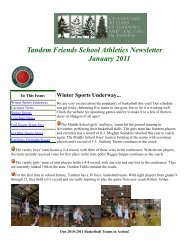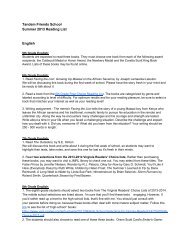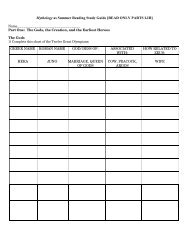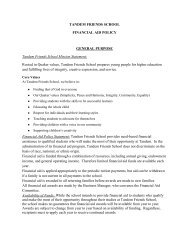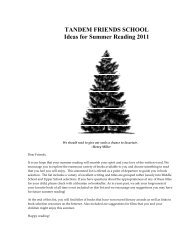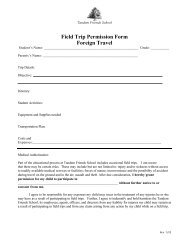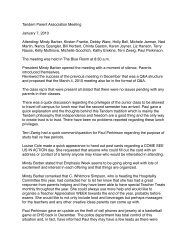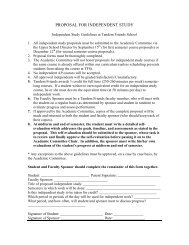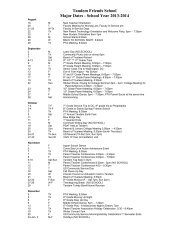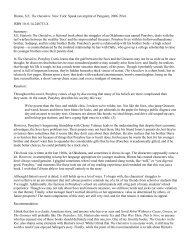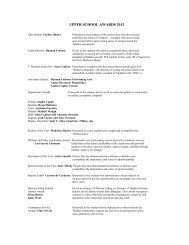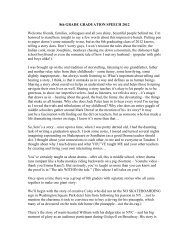Parent & Student Handbook, 2013-2014 - Tandem Friends School
Parent & Student Handbook, 2013-2014 - Tandem Friends School
Parent & Student Handbook, 2013-2014 - Tandem Friends School
Create successful ePaper yourself
Turn your PDF publications into a flip-book with our unique Google optimized e-Paper software.
17<br />
Disruptive Behavior in Classes, including Cards and Monday Hours<br />
Disruptive behavior in class is defined as behavior that interferes with the learning of others and/or prevents teachers<br />
from doing their jobs. Examples are calling out in class, ignoring instructions, and socializing with classmates. We<br />
understand that sometimes students act impulsively and are not trying to deliberately interfere with the learning of<br />
others, therefore the first response is usually a “card” issued by the teacher. The student writes what he or she did on<br />
the card, dates it, and returns it to the teacher. The teacher enters this in a shared Middle <strong>School</strong> spreadsheet. There<br />
are no further consequences for occasional lapses, and parents are not informed. However, if a student accumulates<br />
three or more cards in a fiveday period, the student is given Monday Grounds, an hour of campus cleanup work<br />
scheduled for the next Monday. <strong>Parent</strong>s are informed so that they can adjust pickup time and also follow up with a<br />
discussion at home. Monday Grounds supersedes all other activities, including athletic training and contests, play<br />
rehearsals, music lessons, etc.<br />
Rule Breaking<br />
<strong>Student</strong>s who violate basic Middle <strong>School</strong> rules (being late to class, wearing inappropriate clothing, engaging in risky<br />
and prohibited behaviors such as throwing snowballs and climbing trees, and personal or school property violations<br />
are examples) may earn a card, be placed on Monday Grounds directly, or be scheduled for a conference with their<br />
parents and the Middle <strong>School</strong> Director. The Middle <strong>School</strong> Director will determine the exact consequences on a<br />
casebycase basis.<br />
Major Breaches of Trust<br />
Major breaches of trust include lying, cheating, and theft. <strong>Parent</strong>s are always informed in these cases. The Middle<br />
<strong>School</strong> Director, in consultation with members of the faculty, will determine the exact consequences on a casebycase<br />
basis, which may include suspension from school, and placement on Disciplinary Warning or Probation.<br />
Disciplinary Warning<br />
<strong>Student</strong>s are placed on Disciplinary Warning for serious violations that are judged not severe enough to warrant a<br />
probationary status. <strong>Parent</strong>s are informed in writing, but placement on Disciplinary Warning is not reflected in the<br />
student’s permanent record. Disciplinary Warning generally lasts for one semester.<br />
Disciplinary Probation<br />
If a student on Disciplinary Warning commits a similar offense, he or she will be placed on Disciplinary Probation,<br />
which means the student may be suspended, expelled, or denied reenrollment if he or she commits a similar offense.<br />
Placement on Disciplinary Probation does become part of the student's permanent record.<br />
A student may be put directly on Disciplinary Probation, without first being put on Disciplinary Warning, at the<br />
discretion of the Middle <strong>School</strong> Director. In most cases a student remains on Disciplinary Probation for the<br />
remainder of the school year.<br />
Middle <strong>School</strong> Cell Phone and Device Policy<br />
If Middle <strong>School</strong> students do bring cell phones to school, they may not use them during school hours (8:30AM–<br />
3:30PM), with this exception: if a student needs to check for a message from a parent, he or she can do so during<br />
lunch, after first receiving permission from a teacher. The student can then get the phone and use it in the presence<br />
of the teacher, and return it to his or her locker. 7 th and 8 th grade students must keep their cell phones in their lockers<br />
during school hours. We recommend that students purchase and use locks for their lockers. 5 th and 6 th grade<br />
students must keep cell phones turned off in their backpacks in their classrooms.<br />
Violations of the policy will result in loss of the privilege to bring a cell phone to school.<br />
"Kindness and Wisdom, with Kindness Always First"



